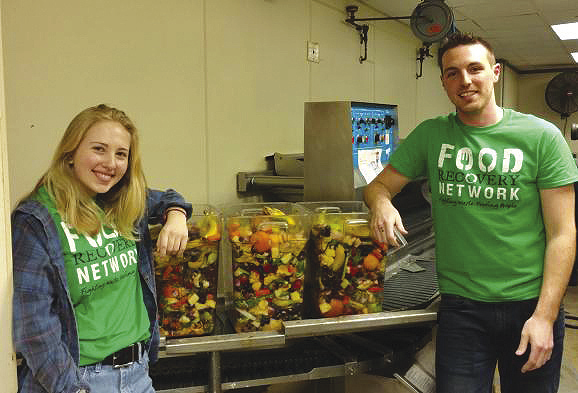Food Waste
NMU?students create first Food Recovery Network chapter in U.P.

Julia Bolton, Northern Michigan University Food Recovery Network treasurer, and Joe Dodd, NMU FRN president, pose for a photo during a recent food audit. (Courtesy photo)

MARQUETTE — Between 30 to 40 percent of the food supply is uneaten and discarded in the United States.
Although it’s challenging to gauge the absolute total of food loss, the U.S. Department of Agriculture Economic Research Service estimates that there’s around 133 billion pounds of food loss annually, making food the largest component in the country’s waste stream. The amount of waste has sweeping impacts on food security, resource conservation and climate change, the USDA’s website states.
In 2011, a group of students at the University of Maryland, College Park noticed an alarming amount of dining hall food was thrown away at the end of the night.
By the end of the school year, students had recovered 30,000 meals and redirected that to Washington D.C.-area hunger-fighting nonprofits. They also founded the Food Recovery Network, a nationwide student-run organization that recovers perishable food from campus dining facilities and donates it to people in need.
It didn’t take long for students attending other universities to open their own chapters — including Brown University, University of California, Berkeley and Pomona College.
“Today, we’re the largest student movement fighting against food waste and hunger and have recovered and donated more than 3 million pounds of food that otherwise would have gone to waste. That’s more than 2.5 million meals that’s gone to those in need,” the FRN website states.
Doing their part to recover food loss locally, Northern Michigan University students incorporated the first official Upper Peninsula chapter of FRN earlier this year.
The NMU Food Recovery Network delivers leftover food from its NMU Dining locations to Room at the Inn’s Warming Center in downtown Marquette.
On average, NMU’s FRN chapter saves about 30 pounds of food each week, with one recent recovery weighing in at over 165 pounds in September. Last year, the student organization recovered over 1,000 pounds of perishable food items on campus, the release states.
“One of the most pressing concerns society faces today is the need to lighten our impact on the planet by using resources more responsibly,” said Joe Dodd, president of NMU FRN and senior economics and environmental studies major, in a press release. “Many colleges across the U.S. are beginning to strive toward sustainability on campus, searching for practical ways to reduce losses and maximize efficiency.”
After conducting three separate surveys at NMU’s dining hall, the study helped to determine that, on average, diners discarded about 500 pounds of food every day — 20 percent of which was compostable material such as raw fruits and vegetables that could be diverted to the NMU Hoop House to reduce disposal costs.
The research project took first place in the undergraduate upper-division category of the 2018 Celebration of Student Scholars competition last May, the release states.
Dodd said raising awareness of food waste on campus could help students recognize some of the underlying costs of producing their meals.
“By making small adjustments in their everyday food habits, students can drastically reduce their impact on the environment and help eliminate food insecurity at the same time,” he said. “As an institution of higher learning, it is important that NMU demonstrates both environmental responsibility and sound business practices on campus by exercising water and energy conservation and actively reducing waste. Our focus aligns with multiple goals in the NMU 2020 Sustainability Plan.”
U.S. food waste, valued at $166 billion per year, accounts for 25 percent of our nation’s freshwater consumption and is responsible for 20 percent of all methane emissions.
“Food waste at this scale leads to unfavorable environmental, economic and social impacts,” Dodd said.
To find out more about NMU FRN, email foodrecoverynmu@gmail.com.
Jaymie Depew can be reached at 906-228-2500, ext. 206. Her email address is jdepew@miningjournal.net.






